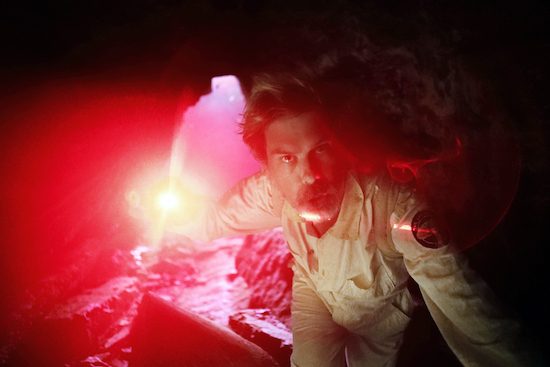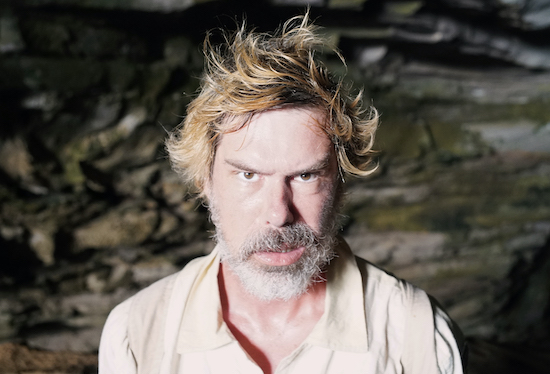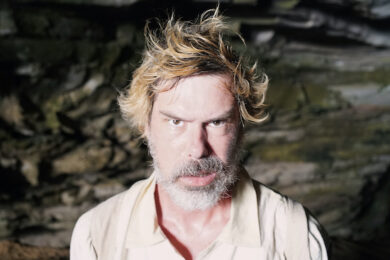Liars, by Clemens Habicht
What happens if you use a potent psychoactive drug twice a day for 20 years – and then just stop? Equally, what is going to happen to the flimsy moral frameworks of our political and legal systems when psychedelics are sold as licensed medicines – but reserved for only the rich and depressed?
Angus Andrew of Liars and I are talking about this today, and the work that went into his new LP, his tenth, titled The Apple Drop, which explores themes of momentum and transformation.
He’s calling from a fairly isolated national park north of Sydney, Australia, his birthplace. We’ve locked in a call today to talk about his (illegal, non-medical) use of psilocybin-containing magic mushrooms as a way to get off, and then replace, his daily dose of the antidepressant drug paroxetine, trade name: Paxil.
There’s an awful lot of this about right now. MDMA, LSD, and DMT – spuriously banned for decades on the basis of their alleged physical and mental harms – are now touted daily as suicide-prevention panaceas by a new wave of psychedelic corporations. Hundreds of clinical trials using these drugs are ongoing, investigating their effects on everything from PTSD to anorexia, depression and OCD, alcoholism, ADHD, and many more. The trials follow a heady mix of regulatory change that has driven investor interest and a shift in public opinion.
Increasing numbers of people want to stop taking antidepressants. It’s understandable: if the insomnia, impotence, weight gain, anxiety, vertigo and neuralgia don’t get you, then the suicidal ideation and flatulence will. Not to mention their poor efficacy rates.
SSRIs work better than placebo: 60% of people respond within about two months to them, with ~50% reduction in symptoms. Now – call me demanding – but I want better odds than 50% from any drug experience. There is hope, though. In a randomised, double-blind, placebo-controlled phase 3 study – the gold standard for clinical proof – MDMA was proven in 2021 to treat PTSD better than any other drug: 67% of long-term sufferers were free of symptoms after one dose. Twenty-two US military veterans take their own lives every day;
Slamming the brakes on neurotransmitter systems that have spent 20 years in cruise control is a bad idea; a slow taper is required. Medics insist – rightly, but with the icy certainty of the statistician – that stopping won’t kill you. That claim is upheld despite the possible return of symptoms, including depression. What’s the most common illness suffered by most people who take their own lives?
Andrew’s Paxil pause was premeditated, and undertaken over six months last year. He feels – and sounds – like it worked. Beyond anecdata, a clear evidence base is emerging. Mushrooms, and LSD, MDMA and DMT, hitting restart on your brain. Ann Shulgin, the psychiatrist wife of MDMA pioneer, Alexander, had it right: “MDMA is penicillin for the soul.”
Psilocybin – the wholesome face of psychedelia – was the substance Andrew turned to when he decided to quit. Slowly, he felt himself return to a baseline he had not known for decades, he says. British academics put it this way in March, 2021.
“The mechanism of action in treatment resistant depression has not been fully elucidated,” they wrote. “However, neuroimaging studies demonstrated disparate short- and long-term modifications of default mode network connectivity, suggested… a ‘reset’ mechanism…which restores normal function, reviving emotional responsiveness.”
TLDR: mushrooms can sort your head out when it’s twisted out of shape.
But quitting antidepressants can be gruelling. Paxil has a vast list of side effects – aka “effects” that are deeply unpleasant, highly unmarketable — but legally permissible, from sleepiness, dry mouth, headache, upset stomach and nausea, mental fog, dizziness, appetite loss and weight gain. Let’s not forget norgasmia, suicidal thoughts, birth defects and cancer. Cessation can trigger insomnia, blurred vision, surges in blood pressure, sweating, constipation, diarrhoea, and weakness.
In the early days of his kick, Andrew experienced a well-documented side effect, known as the “hypnogogic jerk” – that shocking night-time sensation of a jolting rudely awake. It was combined, in his case, with a terrible zapping sound emanating from deep within his brainstem.
“That buzz! It was like a fluorescent light being turned off and on, or a mosquito zapper killing an insect. If I was standing on a street corner and turned my head, I got this warped feeling, like a brain spasm. A horrible vertigo feeling,” he says.
I know the feeling; any acid house lifer does. But psychedelic and empathogenic drugs like MDMA have, even under dancefloor conditions, improved my life and those of my friends. And of those who have used psychedelics under lab conditions, that metric hits a solid 100%. (n = 1).
That “n” refers to my sample size: I’ve met just one person who did psychedelics in a lab. It worked very well for him. At least I show my workings, unlike many of the boosters in this Brave New World. Some of these chancers carelessly chat of “cures” when what they mean is “treatments”.
Full disclosure: I’ve got skin in this game. After 20 years reporting on and investigating drug culture, I have co-founded OEV Partners, a consultancy to the new medipsyne sector, earlier this year. (My word, my money. Patent pending). Me and my pal Chris Jenkins had read yet another piece where the needs of vulnerable, distressed people, or should I say the “Total Addressable Market,” of the new sector, were an afterthought.
I support moves to permit medical use of these drugs – it’s a positive thing. But I want to I want to explore broader notions of psychedelic access. Who, in the words of the peerless chemical historian, Mike Jay, gets to trip?
There are fundamental questions relating to cognitive liberty at stake here. We’ve had ruinous legal controls on these drugs since the year of my birth. 50 wasted years. Should we acquiesce, entirely, to a new gatekeeping system run by doctors funded by corporations?
Me? I figure you’ve got to be in the thick of it when the stakes are this high. Some idealists say psychedelics are being hijacked by a sociopathic digital elite. That’s a matter of opinion – but it’s a cold fact that nobody is calling for systemic cultural change; only individual. And while the WHO might report that 300 million people are depressed, no one is asking why that is.
I’ll have a crack: it is caused in part by an intolerable sense of alienation and dislocation from our true selves, and from the natural world. Thank the capitalist patriarchy. But until the day we have free access to MDMA, antidepressants will, for many, have to suffice. They work – albeit partially. They, plus talking cures, are better than nothing.
Andrew started using Paxil because his doctor told him to do so. “They said: OK. Anxiety? This is what you’ve got to do about it.’ Of course, there’s more I could have done – meditation and so on, but as a 20-something, there’s no way I wouldn’t just take the drug,” he says.
There are better ways to heal than these antique remedies; it just requires a new mindset – one based on science and evidence, and data, not power, corruption, fear and lies. Why do drug designers engineer out any pleasurable effects of the compounds they make? The holy grail in psychedelic drug design today is a new and (patentable) compound that acts like a psychedelic, but doesn’t make you trip. Why are we still so terrified of giggling hallucinators? Why do tens of millions of us accept daily antidepressant use – but clutch their pearls the idea of psychedelics. Maybe it’s connected to our motivations: many of us want to please others – and will do so at our own cost.
“I was taking Paxil twice a day for 20 years,” says AA. “It was like some sort of seatbelt. Then around 10 years into taking it, I started to feel like I was only doing it for the other people in my life, and that’s when I started to try and get off them.”
Ten years later, he has succeeded – thanks in part to a change in the psychic weather. “It’s taken time for people to reject these crazy synthetic drugs. There was a period where everyone was prescribed something. But nobody had any sense of what an alternative was, or came up with a different way,” he says.
Fresh ideas are now emerging: but in a vexatious and predictable form: a flurry of patents on spurious new drugs and treatment protocols filed by corporations. Hippy wigs are not yet on sale at Woolworth’s, but the attempted corporate capture of psychedelics surely reached a baleful nadir in autumn 2020, when Compass Pathways, a well-funded US biotech startup, got caught trying to patent the use of cushions in therapy rooms.
There are plenty of mentally ill people upon which these corporations can feed, though. Misery and ennui are growth industries. In 2018, 7.2% of American adults had a major depressive episode. During 2015–2018, 13.2% of adults aged 18 and over had used an antidepressant in the previous 30 days. Use was higher among women (17.7%) than men (8.4%).
The Nu-corporadeliamarries bombastic New Age sanctimony with a grim jus of end days capitalism. Now that’s a bad trip. And today, legal Canadian cannabis profits are accelerating these drugs’ trajectory from the margins to the front pages.
Psychedelics are the new cannabis, says Gavin Sathanianthan of Alta-Flora, a British based cannabis therapeutics startup. He tells me that Las Vegas clubs can’t now shift regular beer at all. “Kids want hangover-free, low-carb intoxication. Low-dose THC drinks fit the bill perfectly. Psychedelics will soon follow.”
The game is on. and the times are changing. Even in the UK, Conservative thinkers are working to reschedule psilocybin for medical use, highlighting a coming hurricane of post-covid depression.
Andrew decided to stop using Paxil during a lockdown last year. He replaced it with small doses of magic mushrooms – less than half a gramme of dried product every few days. Mini, not micro-doses, for which the evidence is somewhat flimsy – though he did go go macro once or twice.
We spoke for two hours that passed in a few psychedelic blinks.

Liars, by Clemens Habicht
How did you experience your anxiety? What caused it?
Angus Andrew: It manifested in impatience, an inability to be tolerant, in a basic social-skills kind of way. Inside I had this sense of dread and a problem sleeping. On tour, I’d be too anxious to go into the city, or be around a lot of people. Flying was was one of my pain points. Everyone else would be asleep, and I’d be sitting there thinking: “If I let myself drop off, then the plane’s going down." Just constant vigilance.
Were you always sober when you played?
AA: No. I’d be crippled by anxiety in the backstage but I used everything I could to get around that. All I needed to do was just to make it on to the stage. Once I was on the stage, everything was fine. But that whole lead up, I had to turn it into this kind of a ritual where I would be stretching and trying to choose exactly the right music.
Do music and anxiety go hand in hand for you?
AA: In many ways, yeah. When I used to do MDMA, my greatest anxiety would be: what is the music going to be like? How am I going to react to it? What am I going to do about it If I don’t? For me, that illustrates a connection – the more physical connection – that you can have with music when you’re using psychedelics.
How bad did things get for you?
AA: There were times I felt I needed help. I was concerned about compulsive dark thoughts I was having. Where they were going. They were attractive to me in a weird way.
Did you have depression as well as anxiety?
AA: I wasn’t diagnosed, but it wasn’t like I was putting myself in a position where I could be diagnosed.
Was there a specific trigger for you changing path towards mushrooms?
AA: This person I was close with was studying psychology and also growing. He said he would help me get off Paxil. I did some group sessions at first. But, ah, let’s say it wasn’t for me. But when this opportunity presented itself, and there was an argument that it might get me off the meds, I was like: “Sign me up.”
Many artists use their pain as a creative source. Do you subscribe to the suffering artist myth?
AA: That’s a line you tread when you’re trying to mine for creative concepts. I was drawn to writing about those kind of ideas and the dark side side of crime. I moved to Los Angeles at that time and I purposely found a place that was in the toughest part of the city, just so that I could be around as much of that negative energy as possible. It was inspirational in a way.
Some people don’t smoke pot, because it gets them all freaked out and anxious. But there’s something that attracts me towards that kind of state, despite my problems. I’m always searching for ways to try and foster creativity, and that kind of a high anxiety state is a creative space for me.
You’ve started taking magic mushrooms regularly in the last year. How has that been?
AA: I used them first in my teenage years. You know, forest walks etc. But I’d never tried to really harness their power. I was microdosing and minidosing while working on this record, and macrodosing at some points. It gave me a physical connection between the music and my body. I began making musical decisions that were more physical than intellectual. I chose new directions for songs, things were vibrating with me, guiding me.
Tell me about your first experiences.
AA: I did a group session where I took, a hero dose of 5g. (A normal does is 2or 3g of dried mushrooms.) I was told to fast, and we weren’t supposed to talk. We were in this room and there were girls crying throughout the whole thing. I was so hungry. wanted to go and get a burger and smoke a joint.
It was good, in some ways, but I realised I don’t want to sit around in a room and think about myself. It felt like a creative opportunity – so the next time I took mushrooms I got my instruments ready before hand because you don’t want any, uh, wiring, uh problems, you know? [laughs]
Many people argue that psychedelics should only be used under medical supervision, with therapy. Where do you stand?
AA: Last time I did a group session, someone was trying to guide me in a way that I did not need and did not want. Like: “Hey, hey, hey, why why aren’t you with the group?” Why was it so weird for me to want to be in another room?
Have you ever listened to the track ‘Blindness’ by The Fall whilst tripping?
AA: No, but I’m writing that down. Music is so important. During one group psychedelic session, they played this awful screensaver music. It then ramped up to some really naff kind of crescendo. It was incredibly bad.
Why does the new age always have such terrible bloody taste?
AA: It goes beyond that, though. People see psychedelics in a limited way, but there’s room for a lighter touch. To use them to break down of the social barriers – in the same way some people use alcohol. I don’t drink: it doesn’t loosen my bolts like it does for most people. And lower dosing idea was new to me, and it came from the clinical model. I’d always seen psychedelics as something you took to get whacked out. And that’s the trip. Great. But the idea of not going that far, out – say, taking a small amount of psilocybin and going to a dinner party – Using it as a social-anxiety blocker. It’s great.
What do you prefer – indoors, nice doctors, silence – or nature and music and perfect playlists?
AA: Fantastic question. I’d always be up for the natural; my own journey. [Medicalising it] removes a lot of the fun and removes the spiritual, natural side of it. For me, that’s what psilocybin is all about. I’ve had great times out in the city. But the real sweet spot is rolling around in a forest in the daytime. My first trip on this round, I communicated with this incredible lizard in a national park near here.
So you’re using mushrooms in a non-clinical, auto-therapeutic, wellness or recreational way?
AA: Exactly. At first, I was taking half a gramme, or less, twice a week. I did that regimentally, and then every once in a while, I’d pop off for something a bit more intense. Then I worked out that I could be productive and make music for hours if I took, say, a gramme.
Nice. DMT vape pens are the new big thing. Perfect for the busy modern professional. Fancy it?
AA: That scares me. And what’s that weird thing DMT trippers talk about? No. I’m a bit scared of it. I once did PCP and I felt so out of my body. The duration and intensity of DMT
The self-replicating machine elves?
AA: Jesus. The elves. This is stuff of nightmares.
What was your next trip after your reptile communion?
AA: It was at a beautiful time of year. We had a lot of devastating fires and there was a real strange colour to everything. A redness to it, this red dirt and trees, a vibrance. It felt like real end times.
What do you like to listen to – repetitive, hypnotic stuff? Or ambient, ethereal stuff?
AA: All the above. But I’m always a little bit on edge about whether or not I’m enjoying the music. Trying to figure out what I’m going to do next, if I don’t enjoy it. It’s difficult for me. It’s got to be lyric free.
If you could get a vaccine against anxiety, would you take it? There’s one in development right now.
AA: Could I turn it off? This is the first question I think of. Yeah, I want to be vaccinated against anxiety and depression; I’ve struggled with those things. But those things are also beneficial in some way too.
Is LSD a killer productivity app OR WHAT?!
AA: Capitalism is always out for everything, always. It’s the same as neighbourhood gentrification. But even so, It’s so much more interesting that we are able to open up these new ways of thinking about mental health. I’m up for anything that tackles this stuff in a better way than all that crap that has been shoved down our throats for the last 30 years.
How has using psilocybin changed your life – has it changed your outlook or behaviour?
AA: On a cellular level, I feel like I’m free of a chemical poison that I kept shoving into my body for 20 years. That’s a dramatic kind of feeling. It’s changed my libido, definitely. I have a greater sense of my body I’m not super thin, and I’ve never thought too much about my weight or health. Now I’m off the antidepressants, I can feel my body more, and I notice the effects of food more immediately. I’m taking better care of myself. But even though I’m not meditating, a big part of making this record, and this year, has been an acceptance of things being just the way they are. Like, accepting life’s specific gravity. You need to come to terms with yourself; this process has helped me calm my sense of myself.
How do you mean?
AA: I’ve never really allowed myself to go back. I couldn’t listen to works that I’ve made over the last 20 years. I was frightened they wouldn’t be as good as I wanted them to be. Now, for the first time in my life, I’m facing those fears. One of the benefits of life as a a creative person is that you do have these markers that you’ve left, every couple of years through your life, that you can return to and use them as a tool for understanding some of life’s big questions. So I went down that road. Psychologically, that was a major moment for me. Now, I work every morning – I’m always making something. I’m happy with that. And in the afternoons I spend most of my time in the park, or swimming. I just try and be a kid.
Were you more more present when you were a child?
AA: I don’t know enough about how I felt, then. But I do know that the way that I approach being creative is to be more like a child. I purposely don’t learn things, skills like a musician would for over their career to get better. I’ve purposely avoided ever doing that. So every time I come to an instrument I feel like a child, picking up something for the first time. I try and protect it by staying naive. I just even struggle with the idea of calling myself a musician. To be honest, it’s more about just sort of like being an artist to who I guess I stumbled across, you know, sound and songs.
Readers are invited to join OEV Partners’ first Psychedelic Salon, free to the non-bearded. Date TBC. Follow Mike Power on Twitter @MrMichaelPower




